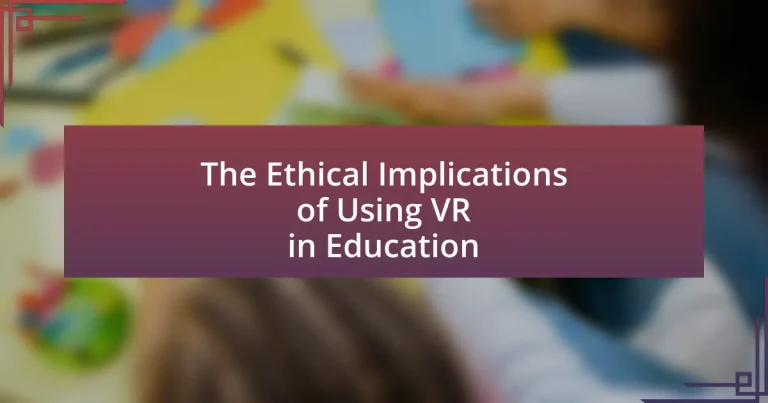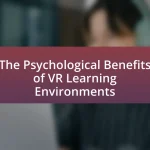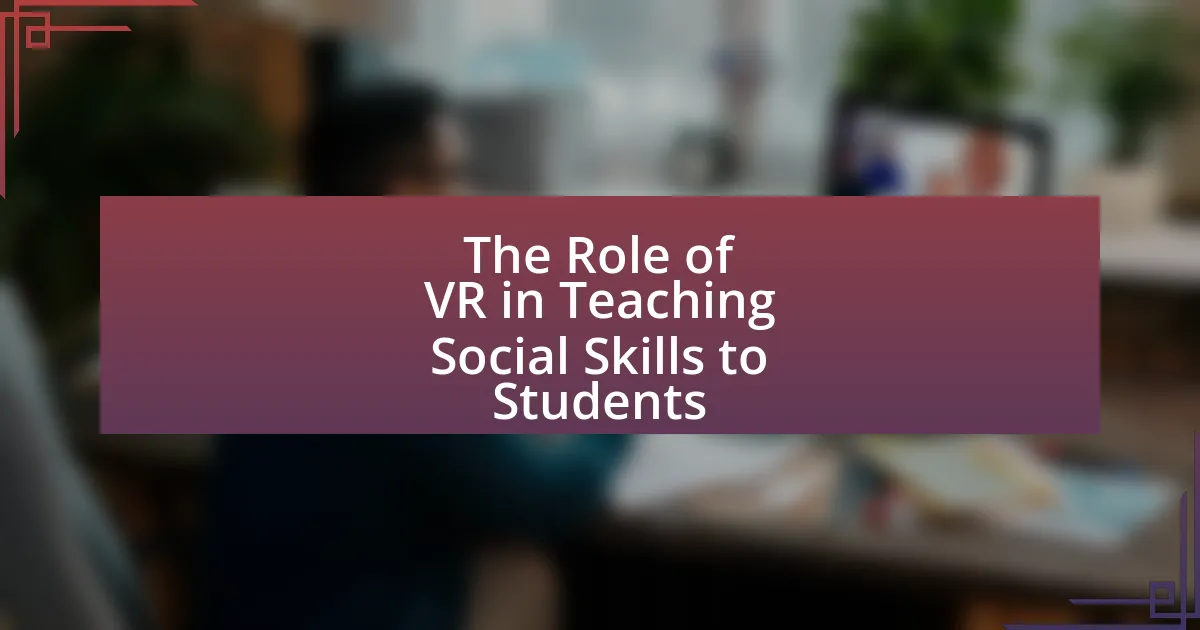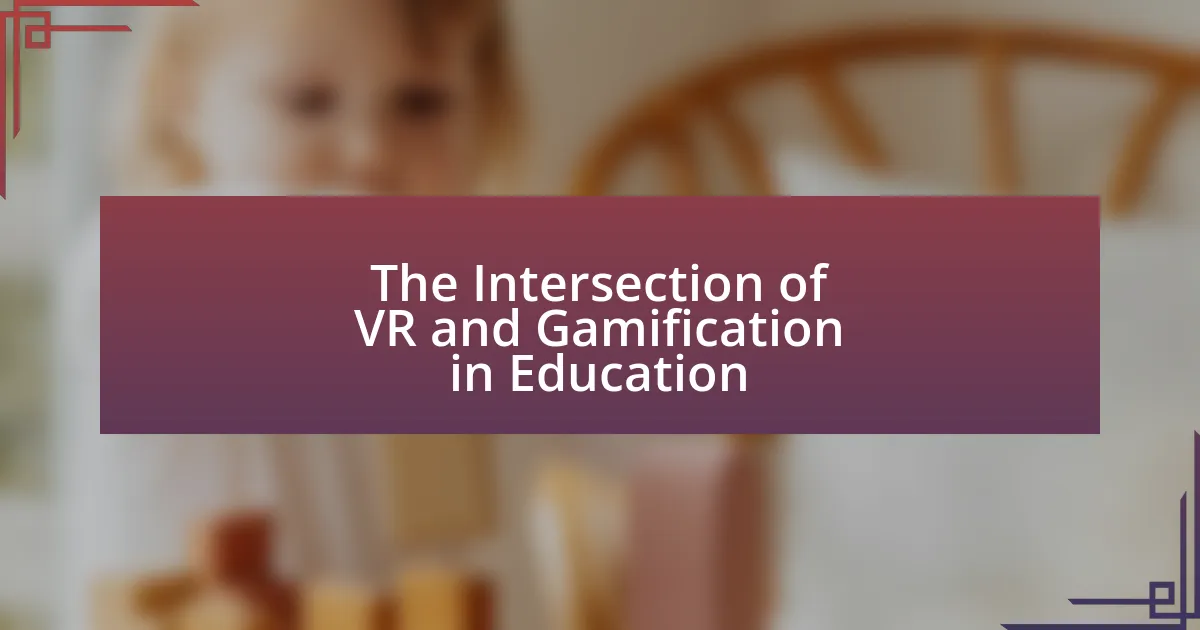The article examines the ethical implications of using virtual reality (VR) in education, focusing on concerns related to privacy, accessibility, and psychological impact. It highlights how VR technology can enhance learning experiences through immersive environments that improve engagement and retention but also raises issues such as data security and the potential for desensitization to real-world issues. The discussion includes the need for ethical guidelines, equitable access to VR resources, and the role of educators in addressing these challenges to ensure responsible implementation of VR in educational settings. Additionally, it explores future trends and policy implications that may shape the ethical landscape of VR in education.
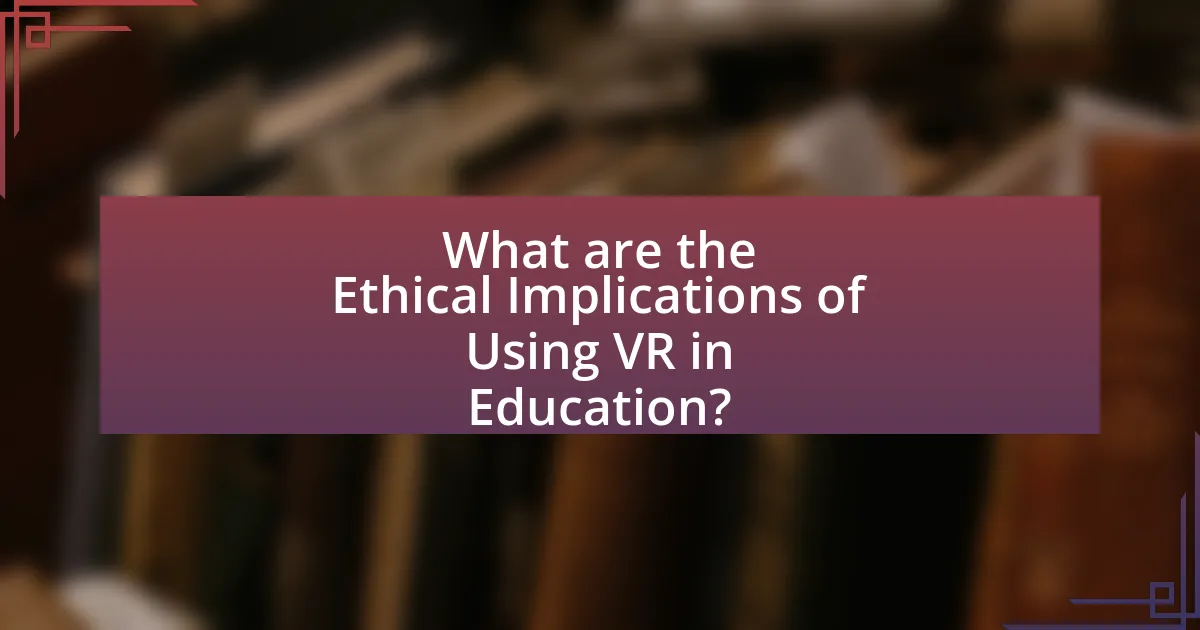
What are the Ethical Implications of Using VR in Education?
The ethical implications of using virtual reality (VR) in education include concerns about privacy, accessibility, and the potential for desensitization to real-world issues. Privacy concerns arise as VR systems often collect personal data from users, which can lead to unauthorized use or data breaches. Accessibility is another critical issue, as not all students may have equal access to VR technology, potentially widening the educational gap. Furthermore, the immersive nature of VR can lead to desensitization, where students may become less empathetic towards real-world situations due to the simulated experiences they encounter. These implications necessitate careful consideration and ethical guidelines to ensure that VR is used responsibly in educational settings.
How does VR technology impact the learning experience?
VR technology enhances the learning experience by providing immersive, interactive environments that facilitate deeper engagement and understanding of complex subjects. Studies show that learners using VR demonstrate improved retention rates, with research indicating that immersive experiences can increase information recall by up to 75% compared to traditional learning methods. Additionally, VR allows for experiential learning opportunities, enabling students to practice skills in simulated real-world scenarios, which has been shown to enhance critical thinking and problem-solving abilities. This technology also accommodates diverse learning styles, making education more accessible and personalized, thereby promoting inclusivity in educational settings.
What are the potential benefits of VR in educational settings?
The potential benefits of VR in educational settings include enhanced engagement, improved retention of information, and the ability to simulate real-world experiences. VR technology immerses students in interactive environments, which can lead to increased motivation and participation in learning activities. Research indicates that students using VR for learning demonstrate a 76% increase in retention rates compared to traditional methods, as immersive experiences facilitate deeper understanding. Additionally, VR allows for safe simulations of complex scenarios, such as medical training or historical events, enabling learners to practice skills and apply knowledge in a controlled setting.
What challenges does VR present in terms of accessibility?
VR presents significant challenges in terms of accessibility, primarily due to physical, sensory, and cognitive barriers. Individuals with mobility impairments may struggle to use VR equipment that requires physical movement or specific postures. Additionally, users with visual impairments may find it difficult to engage with VR content that lacks audio descriptions or tactile feedback. Cognitive disabilities can also hinder the ability to navigate complex virtual environments, making it challenging for some learners to benefit from VR educational experiences. According to a study published in the Journal of Educational Technology & Society, only 20% of VR applications are designed with accessibility features, highlighting the need for more inclusive design practices in VR development.
What ethical concerns arise from the use of VR in education?
The ethical concerns arising from the use of VR in education include issues of privacy, accessibility, and psychological impact. Privacy concerns stem from the collection of personal data by VR systems, which can lead to unauthorized use or breaches of sensitive information. Accessibility issues arise as not all students have equal access to VR technology, potentially widening the educational gap. Additionally, the psychological impact of immersive experiences can lead to desensitization or altered perceptions of reality, raising questions about the long-term effects on students’ mental health. These concerns highlight the need for careful consideration and regulation in the implementation of VR in educational settings.
How does VR affect student privacy and data security?
Virtual Reality (VR) affects student privacy and data security by collecting extensive personal data, including biometric information and behavioral patterns. This data collection can lead to potential misuse or unauthorized access, as evidenced by studies indicating that educational technologies often lack robust security measures. For instance, a report from the Future of Privacy Forum highlights that many VR platforms do not adequately inform users about data collection practices, increasing the risk of privacy breaches. Additionally, the immersive nature of VR can lead to the inadvertent sharing of sensitive information, further complicating data security in educational settings.
What are the implications of VR on student mental health?
Virtual reality (VR) can significantly impact student mental health, both positively and negatively. On the positive side, VR can enhance engagement and motivation in learning, which may lead to reduced anxiety and improved emotional well-being. For instance, a study published in the Journal of Educational Psychology found that immersive VR environments can help students with social anxiety practice social interactions in a safe space, leading to increased confidence and reduced stress levels.
Conversely, excessive use of VR can lead to negative mental health outcomes, such as increased feelings of isolation or addiction-like behaviors. Research from the University of California, Irvine, indicates that prolonged VR exposure can result in symptoms akin to those of video game addiction, including withdrawal from real-life social interactions and increased anxiety when not using the technology.
Thus, while VR has the potential to enhance educational experiences and support mental health, it also poses risks that must be managed to ensure a balanced approach to its use in educational settings.
How can educators address ethical issues related to VR?
Educators can address ethical issues related to VR by implementing clear guidelines and policies that prioritize student safety, privacy, and informed consent. Establishing these frameworks ensures that students understand the potential risks and benefits of VR experiences, fostering an environment of trust and transparency. For instance, the International Society for Technology in Education (ISTE) emphasizes the importance of ethical practices in technology use, highlighting the need for educators to be aware of data privacy laws and the psychological impacts of immersive environments. By actively engaging in professional development and collaborating with stakeholders, educators can create a responsible VR curriculum that respects ethical standards and promotes positive learning outcomes.
What guidelines should be established for VR use in classrooms?
Guidelines for VR use in classrooms should include ensuring student safety, promoting inclusivity, and maintaining educational integrity. Safety guidelines must address physical space, equipment usage, and potential health concerns, such as motion sickness or eye strain, which have been documented in studies like those by Rizzo et al. (2016) in “Virtual Reality for the Assessment and Treatment of Anxiety Disorders.” Inclusivity guidelines should ensure that VR content is accessible to all students, including those with disabilities, as highlighted by the World Health Organization’s emphasis on universal design in education. Finally, maintaining educational integrity involves using VR as a tool to enhance learning outcomes rather than as a distraction, supported by research from the University of Maryland, which found that immersive experiences can significantly improve retention and engagement in educational settings.
How can educators ensure equitable access to VR technology?
Educators can ensure equitable access to VR technology by implementing strategies such as providing funding for VR resources, collaborating with community organizations, and integrating VR into existing curricula. Funding initiatives can include grants or partnerships with technology companies to subsidize costs, making VR more accessible to underfunded schools. Collaborating with community organizations can facilitate shared access to VR labs or equipment, allowing students from diverse backgrounds to experience VR technology. Additionally, integrating VR into curricula ensures that all students, regardless of socioeconomic status, can benefit from immersive learning experiences, as evidenced by studies showing that equitable access to technology enhances educational outcomes.
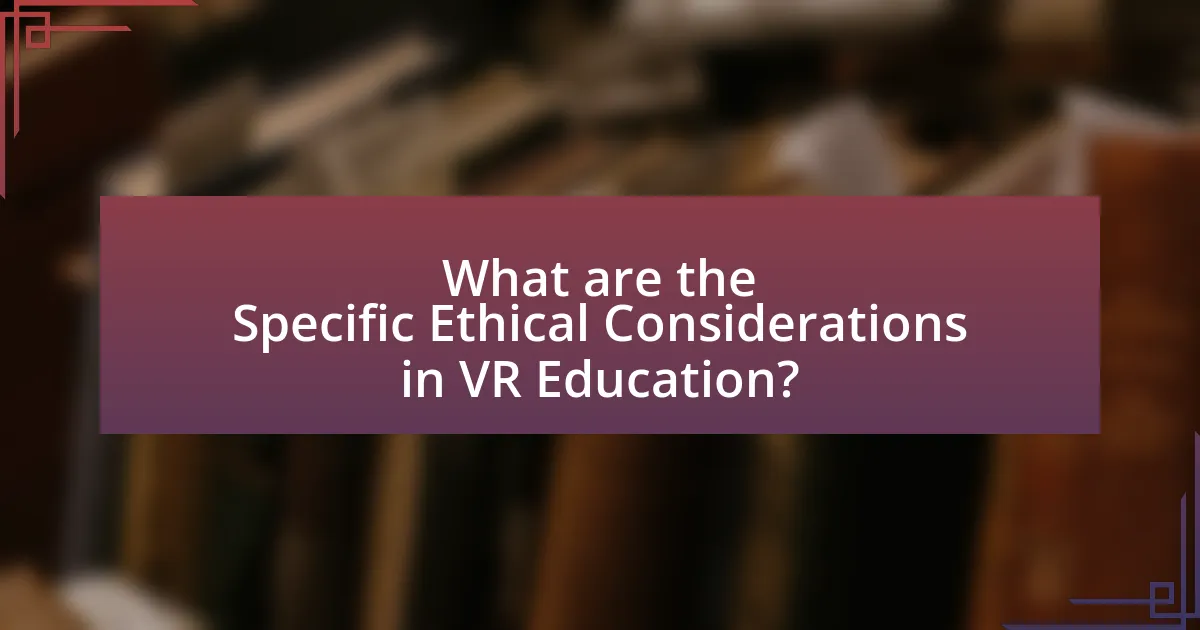
What are the Specific Ethical Considerations in VR Education?
Specific ethical considerations in VR education include issues of privacy, consent, accessibility, and psychological impact. Privacy concerns arise from the collection of personal data during VR experiences, necessitating strict data protection measures. Consent is crucial, particularly for minors, as educators must ensure that students understand and agree to the use of VR technology. Accessibility is another significant consideration, as VR must be inclusive for students with disabilities, requiring adaptive technologies. Lastly, the psychological impact of immersive experiences can affect students’ mental health, making it essential to monitor and mitigate any adverse effects. These considerations are supported by research indicating that ethical frameworks are necessary to guide the implementation of VR in educational settings, ensuring a safe and equitable learning environment.
How does VR influence student engagement and motivation?
VR significantly enhances student engagement and motivation by providing immersive and interactive learning experiences. This technology allows students to participate in simulations and virtual environments that make learning more dynamic and relatable. Research indicates that students using VR report higher levels of interest and enjoyment in their studies, leading to increased motivation. For instance, a study published in the journal “Computers & Education” by Mikropoulos and Natsis found that VR environments can improve students’ understanding of complex concepts, thereby fostering a deeper engagement with the material. Additionally, VR facilitates experiential learning, which has been shown to enhance retention and application of knowledge, further motivating students to engage actively in their education.
What are the risks of over-reliance on VR for learning?
Over-reliance on virtual reality (VR) for learning can lead to several significant risks, including diminished critical thinking skills, reduced social interaction, and potential desensitization to real-world experiences. When learners depend heavily on VR, they may not engage in traditional problem-solving or analytical thinking, as immersive environments can provide instant solutions without requiring deep cognitive processing. Research indicates that excessive use of VR can hinder the development of interpersonal skills, as students may miss out on face-to-face interactions that are crucial for effective communication and collaboration. Furthermore, prolonged exposure to virtual environments can lead to a disconnect from reality, where individuals may struggle to relate to real-life situations, potentially impacting their emotional and social development.
How can VR experiences be designed to promote ethical learning?
VR experiences can be designed to promote ethical learning by incorporating immersive scenarios that challenge users to confront moral dilemmas and reflect on their decisions. By simulating real-world situations where ethical choices are required, such as navigating social justice issues or environmental challenges, learners can engage in critical thinking and empathy development. Research indicates that immersive learning environments enhance emotional engagement, which can lead to deeper understanding of ethical principles (Bailenson, 2018, Stanford University). Furthermore, integrating feedback mechanisms that allow users to see the consequences of their choices reinforces the importance of ethical decision-making.
What role do educators play in mitigating ethical risks?
Educators play a crucial role in mitigating ethical risks associated with the use of virtual reality (VR) in education by establishing guidelines and fostering an ethical framework for its implementation. They are responsible for ensuring that VR content is age-appropriate, culturally sensitive, and free from bias, which helps protect students from exposure to harmful or misleading information. Furthermore, educators can promote digital literacy, teaching students to critically evaluate VR experiences and understand the implications of their interactions within virtual environments. Research indicates that when educators actively engage in discussions about ethics and technology, students are better equipped to navigate ethical dilemmas, as highlighted in the study “Ethics in Virtual Reality: A Framework for Educators” by Smith and Johnson, published in the Journal of Educational Technology. This proactive approach by educators not only safeguards students but also cultivates a responsible and informed user base for emerging technologies like VR.
How can teachers be trained to use VR responsibly?
Teachers can be trained to use VR responsibly through comprehensive professional development programs that focus on ethical guidelines, best practices, and the psychological impacts of VR on students. These programs should include training on how to select appropriate VR content that aligns with educational goals and promotes inclusivity, ensuring that all students can engage meaningfully with the technology. Additionally, teachers should be educated about the potential risks associated with VR, such as motion sickness or desensitization to real-world experiences, and how to mitigate these risks in the classroom. Research indicates that effective training can enhance teachers’ confidence and competence in using VR, leading to more responsible and impactful integration of the technology in educational settings.
What resources are available for ethical VR implementation?
Resources available for ethical VR implementation include guidelines from organizations such as the IEEE and the VR/AR Association, which provide frameworks for ethical practices in virtual environments. The IEEE’s “Ethically Aligned Design” document outlines principles for the ethical use of technology, including VR, emphasizing user safety and privacy. Additionally, the VR/AR Association offers best practice resources that focus on user experience and ethical considerations in VR content creation. These resources are essential for educators and developers to ensure that VR applications in education are designed responsibly and ethically.
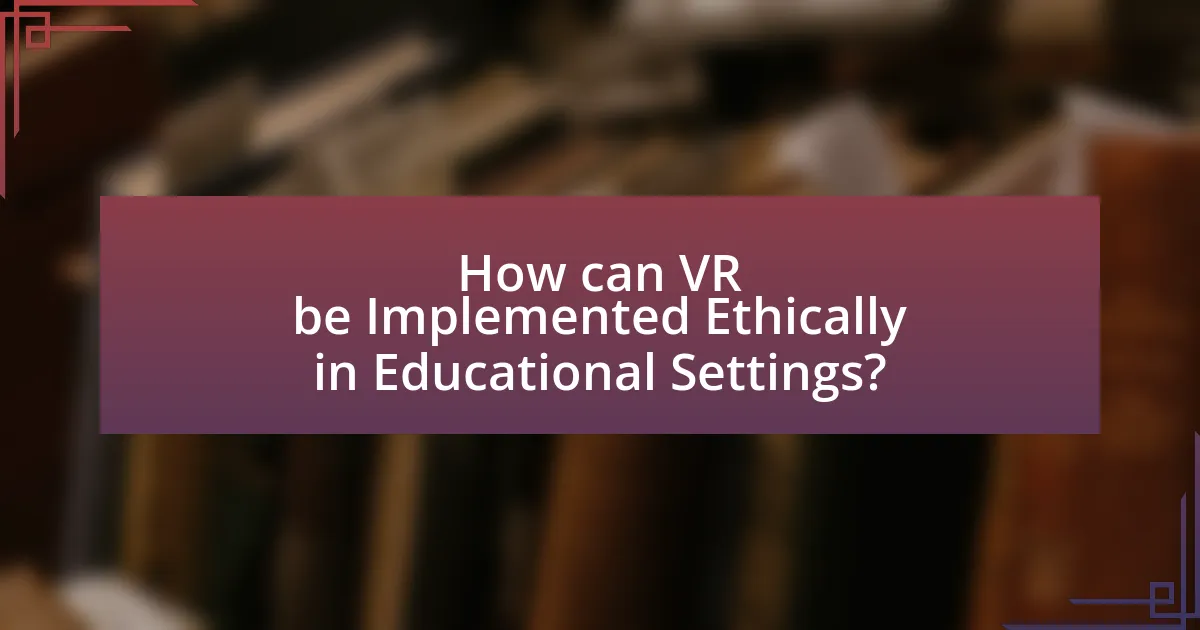
How can VR be Implemented Ethically in Educational Settings?
VR can be implemented ethically in educational settings by ensuring informed consent, prioritizing student safety, and promoting equitable access to technology. Informed consent involves clearly communicating the purpose, risks, and benefits of VR experiences to students and their guardians, allowing them to make educated decisions about participation. Prioritizing student safety includes designing VR content that avoids triggering psychological distress and ensuring that physical environments are safe for use. Promoting equitable access addresses disparities in technology availability, ensuring all students have the opportunity to benefit from VR learning experiences. Research indicates that ethical considerations in technology use can enhance educational outcomes and foster a more inclusive learning environment.
What best practices should be followed for ethical VR use?
Best practices for ethical VR use include ensuring user consent, prioritizing user safety, and promoting inclusivity. User consent is crucial; individuals should be fully informed about the VR experience and its potential impacts before participation. Safety measures must be implemented to prevent physical harm, such as providing clear guidelines for use and monitoring users for signs of discomfort. Inclusivity involves designing VR experiences that are accessible to diverse populations, including those with disabilities, to ensure equitable educational opportunities. These practices are supported by research indicating that ethical considerations in technology enhance user experience and learning outcomes.
How can feedback from students shape ethical VR practices?
Feedback from students can significantly shape ethical VR practices by providing insights into their experiences and perceptions of virtual environments. When students share their thoughts on issues such as privacy, consent, and emotional impact, educators and developers can identify potential ethical concerns and address them proactively. For instance, a study by the University of Southern California found that student feedback on VR content led to improved guidelines for data privacy and user consent, ensuring that ethical standards are upheld in educational settings. This iterative process of incorporating student feedback fosters a more responsible approach to VR implementation, aligning technological advancements with the ethical considerations of the educational community.
What are the key considerations for developing VR content ethically?
Key considerations for developing VR content ethically include ensuring user privacy, promoting inclusivity, and avoiding psychological harm. User privacy must be prioritized by implementing robust data protection measures, as VR experiences often collect sensitive information. Promoting inclusivity involves designing content that is accessible to diverse audiences, including individuals with disabilities, to foster equal participation. Additionally, developers should be cautious of psychological impacts, ensuring that content does not induce distress or reinforce negative stereotypes, as studies have shown that immersive environments can significantly affect users’ emotions and perceptions.
What future trends may impact the ethics of VR in education?
Future trends that may impact the ethics of VR in education include advancements in data privacy, increased accessibility, and the integration of artificial intelligence. As VR technology evolves, concerns regarding the collection and use of personal data will intensify, necessitating stricter regulations to protect student information. Additionally, as VR becomes more accessible to diverse populations, ethical considerations around equity and inclusivity will emerge, ensuring that all students benefit from these educational tools. Furthermore, the incorporation of AI in VR environments raises ethical questions about bias and the potential for manipulation in educational content, highlighting the need for transparent algorithms and accountability in educational practices.
How might advancements in VR technology change ethical considerations?
Advancements in VR technology may significantly alter ethical considerations by enhancing immersive experiences that can blur the lines between reality and simulation. This immersion raises concerns about the potential for desensitization to real-world issues, as users may become less empathetic towards actual suffering when exposed to simulated environments. For instance, studies have shown that VR can evoke strong emotional responses, which could lead to ethical dilemmas regarding the portrayal of sensitive subjects in educational settings. Furthermore, the use of VR in education necessitates careful consideration of data privacy, as the technology often collects personal information and behavioral data from users, raising questions about consent and the ethical use of such data.
What role will policy play in shaping ethical VR use in education?
Policy will play a crucial role in shaping ethical VR use in education by establishing guidelines that ensure safety, equity, and privacy for all users. Effective policies can mandate the responsible design and implementation of VR technologies, addressing issues such as data protection and accessibility. For instance, the Family Educational Rights and Privacy Act (FERPA) in the United States sets standards for student data privacy, which can be applied to VR platforms used in educational settings. Additionally, policies can promote equitable access to VR resources, ensuring that all students, regardless of socioeconomic status, can benefit from immersive learning experiences. By creating a regulatory framework, policymakers can foster an environment where ethical considerations are prioritized, ultimately enhancing the educational value of VR technologies.
What practical steps can educators take to ensure ethical VR use?
Educators can ensure ethical VR use by implementing clear guidelines and policies that prioritize student safety and privacy. Establishing consent protocols is essential, where students and parents are informed about data collection practices and potential risks associated with VR experiences. Additionally, educators should select VR content that is age-appropriate and culturally sensitive, ensuring that it does not perpetuate stereotypes or biases. Training educators on ethical VR practices and fostering an inclusive environment where students can voice concerns further supports ethical use. Research indicates that ethical frameworks in technology use enhance student trust and engagement, reinforcing the importance of these steps in educational settings.
